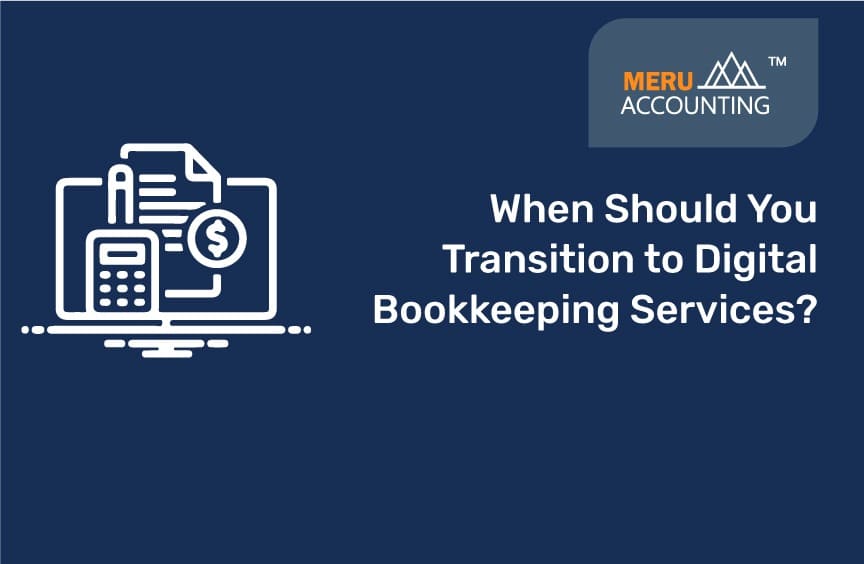Table of Contents
- 1 Key Indicators You Need to Transition to Digital Bookkeeping Services
- 1.1 Manual Processes Are Time-Consuming
- 1.2 Frequent Errors in Financial Records
- 1.3 Need for Real-Time Financial Insights
- 1.4 Compliance and Reporting Challenges
- 1.5 Remote Work and Collaboration
- 1.6 Business Growth and Scalability
- 1.7 Security Concerns
- 1.8 Integration with Other Business Tools
- 2 Conclusion

When Should You Transition to Digital Bookkeeping Services?
Transitioning from manual to digital bookkeeping is essential for businesses aiming to simplify their financial processes, enhance accuracy, and save valuable time. Manual bookkeeping, often characterized by paper records and manual data entry, can be not only time-consuming but also prone to errors. As businesses grow and the complexity of managing finances increases, the limitations of manual processes become more apparent. This guide provides a step-by-step approach to embracing digital bookkeeping Services, ensuring a smooth and efficient transition that supports your business's long-term growth.
Key Indicators You Need to Transition to Digital Bookkeeping Services
Manual Processes Are Time-Consuming
- Efficiency: If you find that manual bookkeeping is consuming a significant portion of your time, it may be a sign that your business is ready for digital bookkeeping services. Digital solutions automate many routine tasks, such as data entry, invoicing, and reconciliation, freeing up your time to focus on more strategic aspects of your business.
Frequent Errors in Financial Records
- Accuracy: Errors are common in manual bookkeeping, leading to financial discrepancies that can impact your business’s financial health. Digital bookkeeping minimizes these risks by automating calculations and providing built-in checks and balances, ensuring that your records are both accurate and reliable.
Need for Real-Time Financial Insights
- Decision-Making: In today’s fast-paced business environment, having access to real-time financial data is crucial. Digital bookkeeping software provides instant updates on your financial status, enabling you to make informed decisions quickly. This is especially important for managing cash flow, planning budgets, and identifying financial trends that can affect your business’s performance.
Compliance and Reporting Challenges
- Regulatory Compliance: Staying compliant with tax laws and financial regulations is a critical aspect of running a business. Digital bookkeeping services help ensure that your business remains compliant by maintaining accurate records and generating necessary reports for tax filings and audits. This reduces the risk of penalties and helps you stay ahead of regulatory requirements.
Remote Work and Collaboration
- Accessibility: With the rise of remote work, having a system that allows for easy access and collaboration on financial data is more important than ever. Cloud-based digital bookkeeping solutions enable multiple users to access and update financial records from anywhere, at any time. This is particularly beneficial for businesses with remote teams, ensuring that everyone stays aligned and informed.
Business Growth and Scalability
- Scalability: As your business grows, the complexity of managing your finances manually increases. Digital bookkeeping solutions are designed to scale with your business, handling a higher volume of transactions and offering advanced features such as financial forecasting and analytics. This scalability ensures that your bookkeeping processes can keep pace with your business’s expansion.
Security Concerns
- Data Security: Protecting your financial data from unauthorized access and cyber threats is a top priority for any business. Digital bookkeeping services typically offer robust security features, such as encryption and secure access controls, to safeguard your data. This provides peace of mind, knowing that your sensitive financial information is protected.
Integration with Other Business Tools
- Integration: If your business uses other digital tools, such as customer relationship management (CRM) systems or inventory management software, integrating them with your digital bookkeeping system can greatly enhance efficiency. Seamless integration allows for the automatic transfer of data between systems, reducing the need for manual data entry and ensuring consistency across your business operations.
Conclusion
Transitioning to digital bookkeeping is not just a trend, but a strategic move that can greatly benefit your business. By investing in the right digital bookkeeping software and providing your team with proper training, you lay the groundwork for successful financial management and long-term growth.
Digital bookkeeping services offer the tools needed to enhance accuracy, efficiency, and compliance, while also providing the scalability and security your business needs as it evolves. Embrace the digital revolution, and take your bookkeeping to the next level with the support of a trusted partner like Accounts Junction, ensuring your business is well-prepared for the future.
